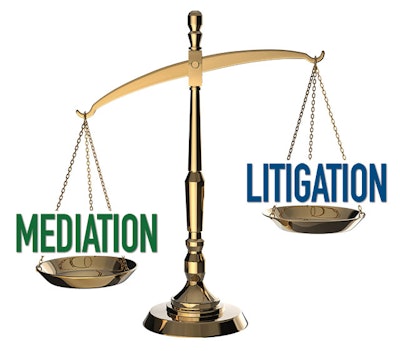
Does anyone ever really win a lawsuit?
In the most literal sense, the answer is, of course, yes — technically speaking, there are always winners and losers. Yet we also know that achieving those outcomes often requires massive legal fees, countless hours of aggravation and, perhaps most of all, the corrosive damage to reputations and relationships as well as a lingering negative impression on consumers. Lawsuits are, by any common measure, a bad deal for everyone involved.
Unfortunately, it's no secret that in the world of pool and spa construction, litigation has become part of the industry culture. Although statistics measuring the number and size of lawsuits stemming from construction defects and other issues do not exist, anecdotal accounts of embittered legal battles within the industry are extremely common and suggest that conflict, for some companies at least, has become an unfortunate part of doing business.
Over my many years covering all things aquatic, I've heard countless stories about lawsuits from plaintiffs, defendants and expert witnesses. Those are typically off-the-record discussions in which involved parties often lambast opposing industry members in the strongest possible terms and express frustration over the substandard state of industry practices.
Make no mistake, many of the expert witnesses and legal combatants I talk to are among the industry's elite, with decades of experience and sterling reputations. While it's obvious why lawsuits are so fraught with peril and frustration, there are many who point out that litigation is in many ways a necessary evil that ensures the industry, in effect, polices itself.
In other words, for as problematic as legal suits may be, many of those who participate in the process do so with only the very best of intentions.
IS THERE ANOTHER WAY?
The good news is that there exists an entire profession devoted to avoiding litigation. It's loosely known as Alternative Dispute Resolution, and there are versions of it for everything from family law and public policy to personal injury/property damage to construction and contracting. On the most basic level, ADR involves negotiation, mediation and arbitration conducted by trained professionals who are either appointed by courts or engaged on a private basis.
Indeed, many judges, jurisdictions and some states mandate ADR prior to suits coming before a court. Likewise, growing numbers of potential plaintiffs and defendants see the wisdom of ADR as a way to avoid the rigors and expense of litigation.
One of the key advantages of ADR is that in many situations, the professional involved will have industry-specific experience, as opposed to a judge, attorneys and jurors who may have little or no working knowledge of the disputed subject matter.
An example of an industry expert who works in ADR is Curt Straub, president of Aquatic Consultants in Shawnee Mission, Kan. To say Straub has industry experience is an understatement. He started in the industry as a teenager in 1962 when he went to work for his dad's pool construction business. Since then he's worked in a variety of industry jobs and is a long-time member of several organizations including the Master Pools Guild, NSPI (now APSP) and the American Concrete Institute (including serving as president of the Kansas chapter). Since 1992, he has been a member and past president of the Heartland Mediators Association.
Straub is passionate about pools and spas, and equally so about using ADR to avoid litigation.
"I don't know why they call it 'alternative' conflict resolution. I think it should be 'primary', the first option," he says. "Staying out of court saves time, reduces cost and reduces risk. The old saying is true: When you go to court, the only people that truly win are the attorneys."
RELATED: "Why Am I at Fault?"
THREE OPTIONS
As mentioned above, ADR involves negotiation, mediation or arbitration. All three offer the advantages of privacy; unlike court proceedings, they are not a matter of public record, and to varying degrees, all three offer a more streamlined process.
Straub has played a role in all three and favors the first two: negotiation and mediation.
Negotiation, he explains, involves one-on-one meetings with opposing parties with the goal of finding common ground. It's the least formal of the three options and often leads to resolution with the least amount of time and effort.
On the other end of the ADR spectrum, arbitration, commonly referred to as "binding arbitration," is the most like a court proceeding. An arbitrator or a panel of arbitrators hears arguments, reviews evidence from both sides and then renders a decision that is typically not open for appeal. It's still less expensive and burdensome than fighting it out in a courtroom, but binding arbitration is, well, binding.
Mediation is by far Straub's preferred method. The mediation process is a facilitated negotiation involving a neutral party who does not decide the outcome. While the mediator does not have a stake in the outcome, he or she will often have experience in the substance of the dispute.
"Mediation gives you an opportunity to identify consensus," he says. "That's why I favor mediation. A decision is not being forced on someone, and even though there may well be compromises for the sake of finding a resolution, the two parties are far more likely to comply because they are part of the consensus-building process. In my opinion, the most intelligent lawyers who are truly acting in their client's best interest are the ones that turn to mediation."
BIG ADVANTAGES
Straub is far from alone in his preference for mediation. Numerous ADR groups and organizations, and many courts, tout the advantages of mediation as a first step in conflict resolution.
"Judges are often very protective of their courtrooms and want to see parties work it out together," Straub says. "They want to see a good-faith effort to come to a resolution. And they will remember those parties who refuse to use mediation and go straight to court. That doesn't usually play out well for them."
Mediation advantages commonly cited by ADR proponents include:
Speed: Mediation typically only takes days or weeks (or in very complex cases possibly months). By comparison, lawsuits typically take months or years. In most situations, mediation allows a more reasonable timetable for resolving a dispute and allows parties to get on with their lives and businesses.
Cost: Mediation is vastly less expensive than a typical lawsuit. Employing a mediator costs significantly less than employing a lawyer, and combined with the much quicker turnaround, participants typically pay less money over a shorter period of time.
Informal Setting: The informality of mediation allows parties to be more engaged than they would be in a courtroom, skirting around the attending rules and procedures that are often designed to separate the parties and can themselves become sources of conflict. Because a mediator works directly with both parties, he or she is able focus attention on the both party's needs and interests rather than on their stated and otherwise entrenched legal positions.
Confidentiality: Unlike a court case, mediation is typically confidential, which means there are no records or transcripts. Any evidence introduced during mediation cannot be used later or revealed. According to ADR proponents like Straub, this reason alone can be reason enough to use mediation rather than file a lawsuit.
Better Relationships: One of the most overlooked benefits of mediation is that it can help preserve relationships that would likely be destroyed through years of litigation. Because it is a collaborative rather than adversarial process, and because mediation isn't inherently a win/lose proposition, important business relationships as well as client relationships can often be saved.
Flexibility and Control: In mediation, unlike a lawsuit, the parties are in control. This means that the parties have a much greater say in negotiations and greater control over the outcome.
More favorable results: Most parties generally report a better outcome as a result of mediation than they do from a lawsuit. Also, because there is no winner or loser, no admission of fault or guilt and the settlement is mutually agreed upon, parties are typically more satisfied with mediation.
Greater Compliance: Finally, because mediation produces better results more quickly, at less cost with the goal of consensus, the involved parties are far more likely to comply with the outcome.
DUE DILIGENCE
With those advantages comes a set of caveats, Straub says. Those include ensuring you know the underlying procedures if a contract that includes an ADR clause references a specific process or organization, knowing the law in your jurisdiction relative to the ADR process and choosing someone who is trained — and, in the best-case scenario, knows the industry.
He also points out that proper preparation for the process is key to a successful outcome. Those steps include identifying your interests and those of the opposing side, identifying your goals and determining what type of future relationship you'd like to have with the opposing parties.
Ultimately, Straub recommends including an ADR clause in contract documentation whenever possible. "The key is you put the clause in the document," he says. "I personally believe that any legal document you sign should have a mediation clause in it. That's the first stopgap, the first safety valve to avoid costly litigation."
Mediation ClauseIncluding a simple mediation clause in contracts can set the stage for less costly and time consuming resolution should a conflict arise. Below, Straug provides a sample clause: If a dispute arises out of or relates to this inspection/evaluation, out of breach thereof, and if the dispute cannot be settled through direct discussions and negotiations, the parties agree to first endeavor to settle the dispute in an amicable, good faith manner by mediation. Both parties also mutually agree upon the mediator, and to pay equal portions of all mediation fees and expenses. |
Comments or thoughts on this article? Please e-mail [email protected].












































